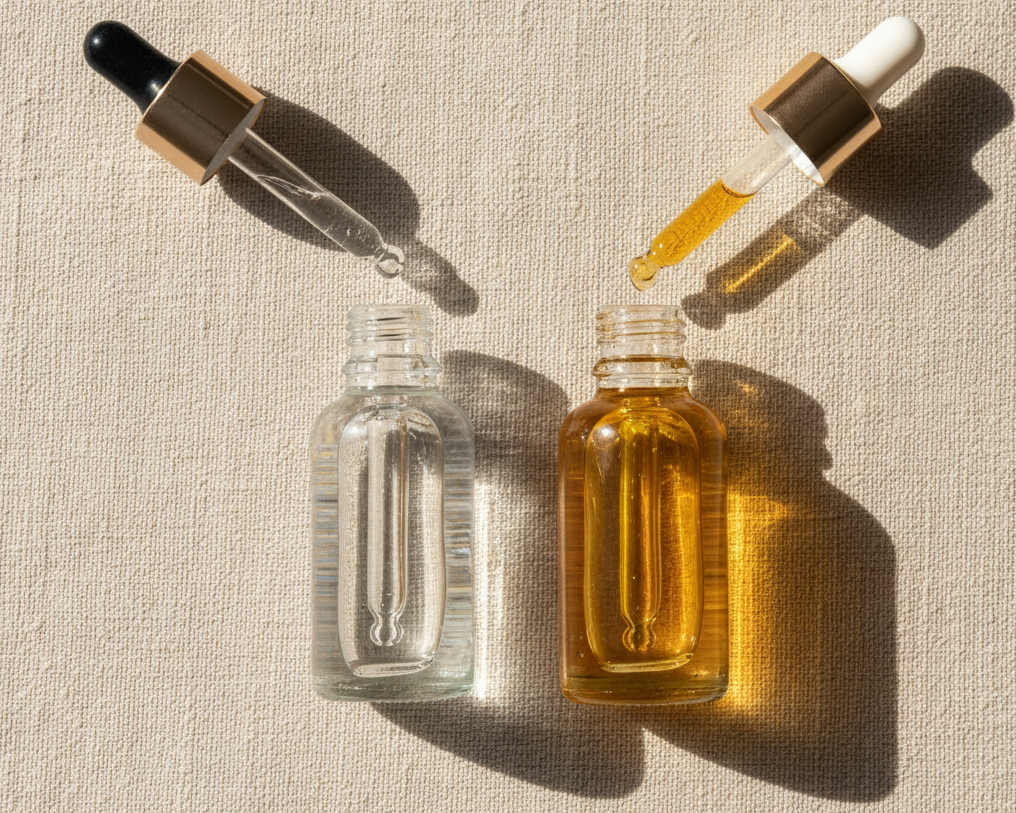
Face Oil vs. Serum: Which Do You Actually Need for Radiant Skin?
Are you confused about how to layer your skincare? We break down the key differences between face oils and serums, explaining when and why each is essential for achieving your most radiant, hydrated complexion.
Walk into any beauty store or scroll through an online skincare aisle, and you'll quickly notice two types of products that often look similar but promise different wonders: face oils and serums. Both come in elegant little bottles, often with droppers, and both are celebrated for their ability to deliver potent ingredients to your skin.
But if you're like many skincare enthusiasts, you might be asking: "Do I actually need both? What's the real difference between a face oil and a serum? And which one is truly right for my skin and my goals?"
This confusion is completely understandable. While they share some similarities, face oils and serums play distinctly different, yet complementary, roles in your skincare routine. Understanding these differences is key to mastering your layering technique and unlocking your most radiant, hydrated complexion. Let's demystify these powerful elixirs.
The Fundamental Difference: Water vs. Oil
The core distinction between a serum and a face oil lies in their base and primary function.
Serums: Water-Based Powerhouses
Think of a serum as a concentrated shot of active ingredients. Serums are typically water-based or have a very lightweight, gel-like consistency. They are designed with smaller molecules that allow them to penetrate deeper into the skin's layers, delivering targeted treatments.
What Serums Do:
- Target Specific Concerns: Serums are formulated to address particular issues like hydration (e.g., with hyaluronic acid), anti-aging (e.g., with peptides), brightening (e.g., with Vitamin C), or acne (e.g., with niacinamide).
- Deliver Potent Actives: Due to their lightweight texture, serums can quickly and efficiently deliver a high concentration of beneficial ingredients.
- Hydrate Deeply: Many serums are excellent humectants, drawing moisture from the environment into the skin for deep, lasting hydration.
Face Oils: Lipid-Based Nourishment
- Face oils, on the other hand, are, as the name suggests, oil-based. They are primarily composed of natural plant oils rich in fatty acids, vitamins, and antioxidants. Their molecular structure is larger than that of serums, meaning they work primarily on the skin's surface and just below.
What Face Oils Do:
- Nourish and Condition: Oils are fantastic emollients, softening and smoothing the skin, making it feel supple and comfortable.
- Protect the Skin Barrier: They help to reinforce your skin's natural lipid barrier, which is crucial for defending against environmental stressors and preventing moisture loss.
- Seal in Hydration: Oils are occlusive, meaning they create a protective layer on the skin's surface, effectively "sealing in" all the water-based products (like your serum and moisturizer) that you've applied beforehand. This prevents transepidermal water loss (TEWL).

When to Use Which (and How to Layer Them)
Understanding their distinct roles makes layering much simpler. The general rule of thumb for skincare application is to go from thinnest to thickest consistency, allowing each product to properly absorb.
- Cleanser & Toner: Always start with a clean canvas (cleanser) and a balanced base (toner).
-
Serum (First): Since serums are typically water-based and have smaller molecules, they should be applied before your face oil. This allows their concentrated active ingredients to penetrate deeply and address your specific skin concerns without being blocked by a heavier oil.
- Your Solution: The Glow Getter | Hydrating Natural Face Serum is designed to deliver concentrated hydration and nourishment deep into your skin after cleansing and toning.
- Moisturizer (Optional but Recommended before Oil): While some oils can be hydrating, most oils don't contain humectants (water-attracting ingredients) in the same way a moisturizer does. For optimal hydration, apply a moisturizer after your serum, especially if your skin is on the drier side. This provides a crucial layer of water-based hydration that the oil can then seal in.
-
Face Oil (Last): As the final step in your routine, face oils act as the protective topcoat. Applied after your serum (and moisturizer, if you use one), they seal in all the beneficial ingredients, preventing moisture from escaping and giving your skin that soft, dewy finish.
- Your Solution: The Nourish and Glow | Radiance Natural Face Oil is a blend of nourishing oils, perfect for sealing in moisture and enhancing your skin’s natural glow as the final step.
Do You Need Both a Face Oil and a Serum?
For most people aiming for optimal skin health and radiance, the answer is yes, using both can be highly beneficial, especially if you have normal, dry, or mature skin.
- If your skin is dry or dehydrated: Absolutely! A hydrating serum followed by a nourishing face oil (and a moisturizer in between) creates a powerful moisture sandwich that combats dryness and reinforces your skin barrier.
- If your skin is oily or acne-prone: You might still benefit from a serum to address specific concerns (like a niacinamide serum for breakouts) and a non-comedogenic face oil to balance sebum production and prevent dehydration. Jojoba oil, for instance, is an excellent choice for oily skin because its structure is very similar to skin's natural sebum, signaling to your skin that it doesn't need to produce more oil.
- If your skin is balanced/normal: Using both can elevate your routine from good to great, providing both targeted treatment and superior protection against environmental factors.

Key Takeaways for Choosing Your Elixirs
- Serums are your treatment specialists, delivering concentrated actives to target specific concerns deep within the skin.
- Face Oils are your nourishment and protection specialists, fortifying the skin barrier, conditioning the surface, and sealing in hydration.
- Layering Matters: Always apply serums (thinnest) before face oils (thickest) to ensure proper absorption and effectiveness.
- Listen to Your Skin: Pay attention to how your skin responds. On certain days, you might only need one; on others, both could be your secret to a radiant complexion.
By understanding the unique roles of face oils and serums, you can confidently build a skincare routine that truly addresses your skin’s needs, leading you closer to that vibrant, healthy glow you desire.






